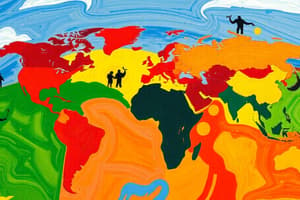Podcast
Questions and Answers
What does the term 'Liberalism' primarily emphasize?
What does the term 'Liberalism' primarily emphasize?
- The collective interests of groups
- The absolute authority of a monarchy
- The supremacy of government over individuals
- Individual freedoms and rights (correct)
Political Science focuses on the actual conduct of state affairs.
Political Science focuses on the actual conduct of state affairs.
False (B)
What is the Latin meaning of 'LIBER' in the context of Liberalism?
What is the Latin meaning of 'LIBER' in the context of Liberalism?
A class of free man
In Liberalism, individuals are viewed as capable of making their own ________.
In Liberalism, individuals are viewed as capable of making their own ________.
Which principle is NOT a foundational aspect of Liberalism?
Which principle is NOT a foundational aspect of Liberalism?
Match the following concepts with their correct descriptions:
Match the following concepts with their correct descriptions:
Who participates directly in politics according to the differences outlined?
Who participates directly in politics according to the differences outlined?
What are the two contrasting areas of focus between Political Science and Politics?
What are the two contrasting areas of focus between Political Science and Politics?
Which principle of socialism focuses on the idea of equal circumstances leading to cooperation?
Which principle of socialism focuses on the idea of equal circumstances leading to cooperation?
Communism advocates for the abolition of private property and the establishment of a classless society.
Communism advocates for the abolition of private property and the establishment of a classless society.
What does the principle of Cooperation in socialism promote?
What does the principle of Cooperation in socialism promote?
The bourgeoisie and the _____ are social classes mentioned in the context of socialism.
The bourgeoisie and the _____ are social classes mentioned in the context of socialism.
Match the following terms with their definitions:
Match the following terms with their definitions:
Which of the following is NOT a form of alienation identified in the context of Marxist tradition?
Which of the following is NOT a form of alienation identified in the context of Marxist tradition?
According to socialism, common ownership resolves competition among individuals.
According to socialism, common ownership resolves competition among individuals.
What is the term for the ideological divide in populism between 'pure people' and 'elite people'?
What is the term for the ideological divide in populism between 'pure people' and 'elite people'?
What is a defining feature of populism?
What is a defining feature of populism?
Populism claims to ensure that the interests of the elite align with those of the common people.
Populism claims to ensure that the interests of the elite align with those of the common people.
What does the term 'General Will' refer to in the context of populism?
What does the term 'General Will' refer to in the context of populism?
Feminism advocates for women’s political, economical, personal, cultural, and social _____
Feminism advocates for women’s political, economical, personal, cultural, and social _____
What is the primary function of the Legislative branch of the Philippine Government?
What is the primary function of the Legislative branch of the Philippine Government?
Match the following divisions of feminism with their core beliefs:
Match the following divisions of feminism with their core beliefs:
The Executive branch is responsible for declaring laws unconstitutional.
The Executive branch is responsible for declaring laws unconstitutional.
Which of the following best describes populist leaders?
Which of the following best describes populist leaders?
Populism promotes strict legal constraints on the will of the people.
Populism promotes strict legal constraints on the will of the people.
Who is the head of the Executive branch in the Philippines?
Who is the head of the Executive branch in the Philippines?
The _______ branch can override the President's veto of a law.
The _______ branch can override the President's veto of a law.
What do political elites tend to favor in terms of interests?
What do political elites tend to favor in terms of interests?
Match the powers and functions to the Executive branch:
Match the powers and functions to the Executive branch:
Which article pertains to the Accountability of Public Officers?
Which article pertains to the Accountability of Public Officers?
The Judicial branch is composed of the President and Congress.
The Judicial branch is composed of the President and Congress.
What is one of the roles of the President as the Commander in Chief?
What is one of the roles of the President as the Commander in Chief?
Which constitution first established the separation of Church and State in the Philippines?
Which constitution first established the separation of Church and State in the Philippines?
The 1973 Constitution allowed for a parliamentary system of government with absolute power given to the President.
The 1973 Constitution allowed for a parliamentary system of government with absolute power given to the President.
What is the primary purpose of the preamble in the Constitution of the Philippines?
What is the primary purpose of the preamble in the Constitution of the Philippines?
The _____ Constitution is considered the first republic in Asia.
The _____ Constitution is considered the first republic in Asia.
Match the following articles of the Philippine Constitution with their corresponding content:
Match the following articles of the Philippine Constitution with their corresponding content:
Which of the following constitutions included provisions for the conservation of resources?
Which of the following constitutions included provisions for the conservation of resources?
The Article on Suffrage includes the right to vote.
The Article on Suffrage includes the right to vote.
What significant change did the 1916 (Jones Law) introduce to the Philippine Constitution?
What significant change did the 1916 (Jones Law) introduce to the Philippine Constitution?
Flashcards are hidden until you start studying
Study Notes
Struggles of Interests in Individuals and Groups
- Individuals and groups often face challenges in promoting their interests, which can lead to cooperation or conflict.
- Political science studies the relationship between the state and its people, while politics pertains to daily life and individual activities.
- Fewer individuals participate in political science compared to the broader population engaged in politics; political science analysis can be intricate, while political opinions tend to be more direct and fixed.
- Political science enhances political participation by educating citizens on constitutional rights, recognizing abuses, and improving political engagement quality.
Political Ideologies Overview
Liberalism
- Liberalism serves as a response to feudalism, advocating for individual freedom and a democratic state.
- Core principles include:
- Individualism: Emphasizes personal autonomy and decision-making.
- Freedom: Supports the pursuit of individual interests and needs.
- Reason: Encourages rational thought in the pursuit of aspirations.
- Advocates for essential services such as healthcare and education.
Socialism
- Socialism focuses on social equality and cooperation among individuals.
- Key components include:
- Social Equality: Aims for equal circumstances to foster community engagement.
- Community: Highlights bonds within social groups and individual identity.
- Cooperation: Encourages collective interest over conflict.
- Social Class: Seeks to bridge gaps between classes, such as the proletariat and bourgeoisie.
- Common Ownership: Calls for shared property to reduce competition.
Additional Political Ideologies
Communism
- Advocates for the abolition of private property to achieve a classless society.
- Based on the belief that private property supports capitalism, leading to worker alienation:
- Workers lack ownership and fulfillment in their labor.
- Produces a cycle of alienation among workers and from personal identity.
Populism
- Described as an ideology that distinguishes between "pure people" and "elite," emphasizing general will.
- Core concepts of populism include:
- The ambiguity of "the People" and its essential connection to political mobilization.
- Critical view of "the Elite," who pursue self-interests contrary to public needs.
- Advocates for legislation reflecting collective interests, less hindered by elite interests.
- Strong emphasis on charismatic populist leaders as representatives of the common person.
Feminism
- Pushes for recognition of women's political, economic, and social rights.
- Divided into factions:
- Liberal Feminism: Asserts equality between genders in rights and opportunities.
- Socialist Feminism: Looks beyond politics to address root causes of gender inequality.
Philippine Constitution
- Defines citizens' rights and serves as the supreme legal framework.
- Historical evolution includes significant milestones:
- 1899 Constitution marked the separation of church and state.
- 1935 Constitution introduced citizenship and sovereignty ties with the U.S.
- Current constitution, established in 1986, emphasizes democracy and human rights.
Structure of the Philippine Constitution
- Preamble: Outlines foundational principles and national purposes.
- Articles: Comprise diverse subjects, including:
- Bill of Rights: Enshrines individual freedoms and protections.
- Legislative, Executive, and Judicial Departments: Defines respective powers and functions.
Philippine Government Branches
- Checks and Balances: Essential for maintaining authority among branches.
- Legislative can create laws but is subject to executive veto.
- Executive can veto legislative laws, which congress can override.
- Judicial can declare laws unconstitutional while judges are appointed by the executive.
Executive Branch Functions
- Head of State: Represents the Philippines internationally.
- Chief Executive: Manages government administration.
- Chief Diplomat: Oversees foreign relations.
- Powers include appointment authority, issuing executive orders, and managing local governments.
These notes cover the complexities of political interaction, ideologies shaping governance, the framework of the Philippine Constitution, and the functions of its government.
Studying That Suits You
Use AI to generate personalized quizzes and flashcards to suit your learning preferences.




